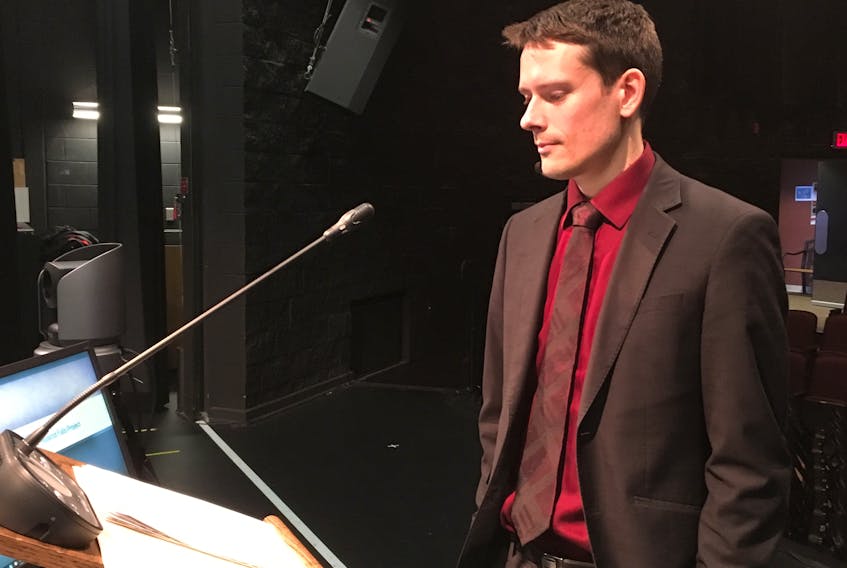HAPPY VALLEY-GOOSE BAY, N.L. — Commissioner Richard LeBlanc said it before and, on Wednesday, said it again: he will not make recommendations on the constitutional rights or land claims of Indigenous people in Labrador in his final report.
LeBlanc repeated his position during lawyer Julia Brown’s final submission on behalf of the Innu Nation to the Muskrat Falls Inquiry. She laid out clear concerns held by her clients as to how LeBlanc was going to address any duty to consult and accommodate, when considering different groups. That includes the NunatuKavut Community Council.
The Innu Nation and NunatuKavut remain at odds on the latter’s status, with the Innu Nation arguing during the inquiry against recognition for NunatuKavut. The two have overlapping areas of asserted rights, but the Innu Nation has been working to settle a land claim, following a long process that required first achieving recognition of their rights on the part of the provincial and federal governments. It led to an agreement in principle on a comprehensive land claim in 2011. In 2018, the federal government committed to opening talks with NunatuKavut, suggesting it could lead to more formal recognition of some kind.
LeBlanc said he’s not deciding on what kind of consultation was legally owed to the Indigenous groups or individuals for the project.
“You’ve told me you don’t want me to get into that. I’m going to assure you I’m not going to get into that. Have no fear about that. I’m not going there,” he told Brown.
“But I am going to look at consultation. The province in this particular case decided they were going to have consultation with various groups, or indicated they were going to have consultation. I’m going to see if they did it, what they said they were going to do, and I’m going to comment on that if I feel it’s appropriate to do so.” -LeBlanc
Brown said it will be difficult for LeBlanc to assess what he wants to without looking at the duty to consult and accommodate and what is owed. She explained she specifically means the level of what is owed – something speaking to status.
She said the Innu Nation doesn’t dismiss the duty of the governments to all Labradorians. She told LeBlanc “consultation” has a different meaning when you are talking about an Indigenous government with recognized right in the area. There is a constitutional component, where consultation and accommodation must be of the highest level and “the honour of the Crown requires it.”
“In our view it’s really, it’s impossible to divorce these two concepts: adequacy and appropriateness of consultation and the underlying rights claim,” Brown said.
LeBlanc said his plan is really to look at what commitments were made, and that can be done without negatively affecting Indigenous affairs.
“I’m going to accept that there was an obligation (to consult) because the province and Nalcor accepted there was an obligation and I’m just going to go from there, to see whether or not what happened was appropriate in the circumstances based upon that. But I’m going to be very clear that anything I do has nothing to do with any recognition or non-recognition of constitutional right or land claim or anything of that nature,” he told Brown.
Lack of trust developed during project
The NunatuKavut Community Council has made the job more challenging for LeBlanc. The written brief specifically asks the commissioner to, among other things, recommend the governments deal with NunatuKavut on any future projects in the area at the highest possible level of consultation and accommodation – so that if NunatuKavut is not satisfied, the project does not go ahead.
NunatuKavut Community Council representative Jason Cooke said it would ultimately be for LeBlanc to use what he will for his final report.
But he also took the opportunity before the commissioner to speak about issues falling under the category of “small c” consultation, common to people throughout the area.
Cooke summarized some of the history of the Muskrat Falls project, including the legal win for NunatuKavut in the courts against a permanent injunction targeting NunatuKavut members and applicable to all areas of the project. He said the need to go to court shows the lack of meaningful engagement at the time.
Cooke said a lack of trust developed during the project, including on the issue of methylmercury and potential downstream environmental effects. All lawyers said LeBlanc is not in a position to re-do the work of the environmental assessment (Joint Review Panel) or the work of the Independent Expert Advisory Committee (IEAC) on methylmercury. But Cooke said the lack of follow-through on the independent efforts deserves to be considered.
“Really, from NunatuKavut’s perspective, we can see no good reason why the work of the IEAC could not have been done prior even to the joint review panel process, but certainly before sanction." -Cooke
Final submissions on behalf of the Conseil des Innu d’Ekuanitshit similarly argued a lack of follow-through by the province and Nalcor Energy. Lawyer David Janzen highlighted a lack of recognition of rights by the province, describing what were considered shortcomings on consultation (in, for example, not offering documents translated to the Innu language, or at least French, being the second language of the Indigenous group with land use covering a geographic area including from Mingan to the Churchill River, crossing the Quebec-Labrador border).
A written submission says the group was “not seriously consulted” on the project’s main assessment, or for its many construction-related permits.
Trust was similarly an issue for Caitlin Urquhart, on behalf of the Grand Riverkeeper Labrador and Labrador Land Protectors. Her submissions included discussion of potential improvements for public communication.
The Grand Riverkeeper and Labrador Land Protectors want LeBlanc to issue a recommendation that environmental review panel recommendations be made binding. But LeBlanc has already said that would be a step too far.
“It’s important to understand here, as I do, that environmental issues are very important,” he said. “Sometimes they’re more important to some people than they are to others, and there is a balancing that our elected governments have to take in that regard. So some of what you’re asking me to look at here is a little bit beyond what I think would even be fair for me to try and do.”
The Telegram will have more from the final submissions later this week.
RELATED









